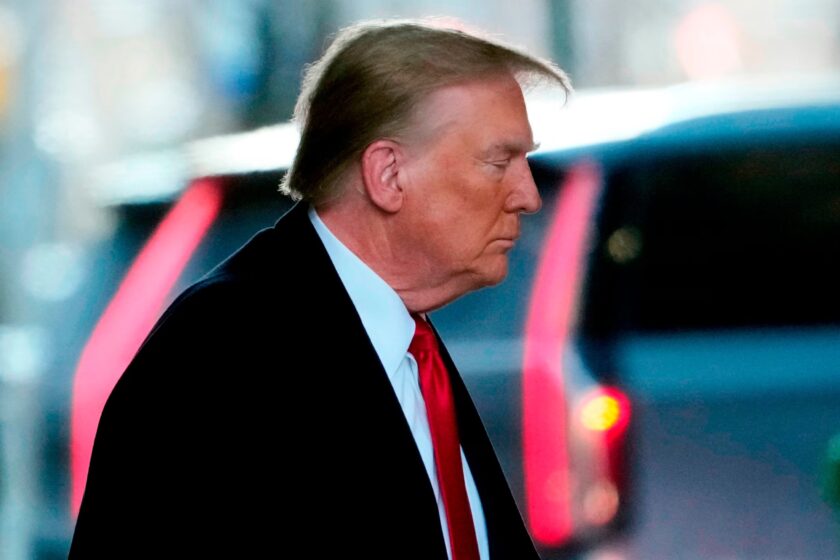If the justices of the Supreme Court want to allow Donald Trump to seek the presidency, they will have to throw their originalist and textualist doctrines out the window to do it.
Pundits find it convenient to pigeonhole the Supreme Court justices into “liberals” and “conservatives,” but it is difficult to define exactly what these labels mean, except to say that the six “conservatives” were all appointed by Republican presidents, and the three “liberals” by Democratic presidents. Perhaps the only workable definition for their supreme partisanship is the one Justice Potter Stewart had for hard-core pornography in Jacobellis v. Ohio: “I know it when I see it.”
The justices are supposed to make their decisions based on the facts and the law, but this is rarely the case when it comes to policy-freighted constitutional questions. That is why, according to Gallup, the high court’s approval rating is at 40 percent, its lowest ever — their decisions don’t work for most of the people who perceive the justices as politicians in robes.
The real divide, according to the late Justice Antonin Scalia, is whether a jurist thinks of the Constitution as a living document that evolves — meaning what the justice would like it to mean — or whether it is to be interpreted in accordance with its text as originally understood by the generation that drafted it. The Constitution is dead, said Scalia: “Dead, dead, dead.” Its meaning is immutable; it means what it says.
Let’s take the case to be argued before the court on Feb. 8, the issue of Donald Trump’s disqualification under the 14th Amendment, Section 3. The Colorado Supreme Court disqualified Trump from the ballot, and its determination is properly up for review. The six conservative would obviously want to keep the GOP frontrunner on the ballot, but it appears that their doctrinal bias of textualism and originalism will stand them in little stead.
Retired conservative Judge J. Michael Luttig, who believes that Trump should be disqualified for engaging in an insurrection on Jan. 6, 2021, has just filed a devastating amicus brief, riddled with irony, in which he sticks it to the conservatives on the bench by citing their own decisions and language against them. Luttig is the guy who advised Mike Pence it would be illegal for him to throw the 2020 election Trump’s way, causing Trump to threaten, “I’m going to be very disappointed in you. I will tell you right now. I’m not hearing good stories.”
Trump’s brief argues that the challenges to his candidacy threaten “to disenfranchise tens of millions of Americans” and “promise to unleash chaos and bedlam.” So Luttig responds with a citation to Dobbs v. Jackson Women’s Health Organization, the case that overturned Roe v. Wade, where Justice Samuel Alito stressed “we cannot allow our decisions to be affected by extraneous influences,” including how the public and politicians may react.
Then Luttig takes originalism by the horns. His brief contends that:
Most important, Section 3 of the Fourteenth Amendment must be interpreted in light of “the understandings of those who ratified it.”
J. Michael Luttig
The phrase he quotes was written by Justice Clarence Thomas. And Luttig goes on to spell out exactly what those understandings were. Insurrectionists like Jefferson Davis could not be president.
He argues for a sensible construction of the text. He cites Scalia that the “textualist’s touchstone” is to give every constitutional provision its “fair meaning.” A narrow construction to promote judicial restraint is just as bad as an “unreasonably … enlarged” construction. Scalia approvingly quoted Justice Story that it is forbidden to narrowly construe a constitutional provision “as if it were subversive of the great interests of society, or derogated from the inherent sovereignty of the people.”
Luttig writes, “Trump’s brief misplaces reliance on the use of ‘Officers of the United States’ in three clauses of the Constitution as ratified in 1788.” Luttig argues that the total answer is found in an article titled “What Scalia Thought About Whether Presidents Are ‘Officers of the United States.’” He plainly thought they were.
Justice Thomas’s favorite amendment to the Constitution is the Second Amendment, enshrining the “right of the people to keep and bear arms.” He views the provision as an “unqualified command.” Thomas went with Scalia in holding that having a gun was a personal right, not one that existed only in the context of “a “well regulated Militia.” Luttig played to Thomas’s sweet spot, quoting Scalia’s words in the 2008 Heller decision that “it is not the role of this Court to pronounce the Second Amendment extinct” and thus concluding that “it is not the role of this Court to render Section 3 extinct.”
Then there is the issue of whether the states can exclude Trump from the ballot now or whether we all are to wait until he is possibly elected and about to take office before he can be disqualified. Too bad for Trump that Justice Neil Gorsuch went the other way on this in a case when he was an appellate judge. He held in 2012 that “a state’s legitimate interest in protecting the integrity and practical functioning of the political process permits it to exclude from the ballot candidates who are constitutionally prohibited from assuming office.”
I always thought it a longshot that the Supreme Court would disqualify Trump. But, after reading Judge Luttig’s brief, I believe that this “conservative” court will decide the Constitution requires Trump’s disqualification.
James D. Zirin, author and legal analyst, is a former federal prosecutor in New York’s Southern District. He is also the host of the public television talk show and podcast Conversations with Jim Zirin.

